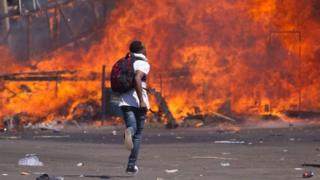Annie
Diamond Member
- Nov 22, 2003
- 50,848
- 4,828
- 1,790
http://normblog.typepad.com/normblog/2005/03/for_zimbabwe.html
March 30, 2005
For Zimbabwe
As Zimbabwe prepares to vote tomorrow, and Mugabe warns that an opposition victory 'will not be tolerated', please read this personal testimony, an email from inside Zimbabwe two days ago, about the fight of the people of that country for their future:
We go to the polls here in Zimbabwe in three days time! Those of us who are deeply involved with the MDC are totally exhausted, many are hoarse from speaking at meetings two and three times a day for weeks, many are both physically and mentally exhausted by the effort they have put into the campaign.
I have often pointed out to any who will listen, that the MDC is a Party of the Poor. If you had visited a Zanu rally you would have been astonished at the variety of vehicles in the vicinity - army, police, CIO, Mercedes, BMW, every form of 4x4 and luxury twin cab you can name and a few you probably have never seen. By contrast at the MDC rally on Saturday, with 35,000 people crammed into a stadium that holds 15,000, there were a handful of battered pick-ups and the now familiar armored twin cab that carries the President.
On Wednesday evening we will deploy our own army to their posts. An army of peasant farmers, widows, grandmothers and low-income workers. This army - numbering 35,000 - have all volunteered to have their names printed in the newspaper for all to see, along with their ID numbers and physical addresses, and will go out to witness and supervise the elections at 8,300 polling stations.
They will have to walk to their stations in most cases; many will sleep at the stations they are looking after because they live too far away. Only a handful will have their own transport and the MDC simply cannot move them to their stations because they themselves have no "wheels".
They will vary from illiterate people who cannot write their names to teachers and headmasters who have defied their government employers to help. They will carry small packs - a candle, a box of matches, some toilet paper, 2 kilograms of maize meal and some form of "relish" to go with it. Perhaps some water in a plastic bottle.
They will have to man their stations for up to 24 hours straight - no sleep as people will vote all day and in some cases well into the night. They run the risk of physical violence and intimidation and offers of money to abandon their posts or allow the operation of the station to be subverted while they are there.
After the election they have been threatened with the loss of their jobs, transfers to hostile places and the denial of food and medicine for their families. In Masvingo the Head of the Armed forces said this past week that the "bushes would become soldiers and MDC supporters beheaded"...
[lots more]






